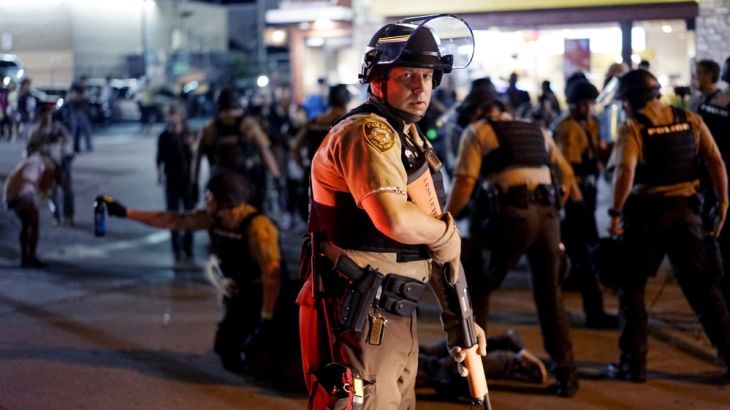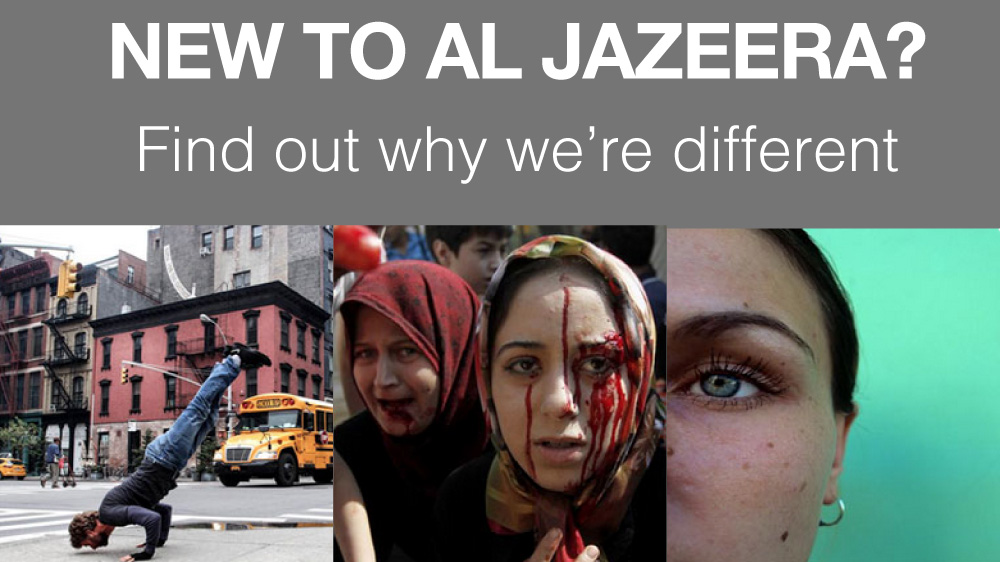Police shooting and protests put Ferguson back on edge
Riot police contain roughly 200 protesters after violent anniversary of police shooting of black teenager Michael Brown.

Protesters regrouped in Ferguson, Missouri, after a state of emergency was declared, aimed at preventing a repeat of violence the night before on the anniversary of the police shooting of an unarmed black man.
Police in riot gear contained roughly 200 protesters who had gathered in the streets of Ferguson on Monday evening.
Keep reading
list of 4 itemsPalestinian Prisoner’s Day: How many are still in Israeli detention?
‘Mama we’re dying’: Only able to hear her kids in Gaza in their final days
Europe pledges to boost aid to Sudan on unwelcome war anniversary
The demonstrators, some waving flags, beating drums, and shouting anti-police slogans, marched along a street that was a flashpoint of last year’s riots which erupted after white police officer Darren Wilson shot dead 18-year-old black teen Michael Brown.

Nine people were arrested late on Monday after a group of protesters briefly blocked the roadway, though demonstrations late into the evening were largely peaceful.
Authorities had declared a state of emergency on Monday for the St Louis suburb and surrounding areas after police officers shot and critically wounded a man in an exchange of gunfire Sunday night, marring what had been a day of peaceful demonstrations.
Police just charged at protesters and snatched several men. @stlcountypd officer alleges "they had weapons". Ferguson pic.twitter.com/BcSbKNfLKf
— Jon Swaine (@jonswaine) August 11, 2015
Among the demonstrators on Monday evening was 51-year-old Ferguson resident Roberta Lynch, who said relations between the police and community had improved little over the past year.
RELATED: Ferguson: ‘They were never here to protect us’
“They are doing the same old stuff, taking our rights,” Lynch said. “They need to give us our space.”
Monday’s demonstrations capped a day of civil disobedience called by activists to protest the shooting of Brown and other unarmed black men across the United States by police.
Clergy and civil rights groups led a series of protests, at one point staging a demonstration at a courthouse in St Louis where 60 people were arrested, including Princeton University professor and activist Cornel West, according to a protest organiser.
Hours later, police arrested dozens of protesters who blocked rush-hour traffic on Interstate 70 a few kilometres from Ferguson, according to a Reuters news agency witness.
The death of Brown and a grand jury’s decision to spare the white officer from criminal charges led to a wave of demonstrations that boiled over into rioting and arson at times and spawned sympathy rallies across the country.
Brown’s death also prompted greater scrutiny of racial bias within the US criminal justice system, giving rise to the “Black Lives Matter” movement that gained momentum from other high-profile killings of unarmed minorities by white police in cities such as New York, Baltimore, Los Angeles, Cincinnati, and most recently, Arlington, Texas.
‘Marred by violence’
Tensions grew as darkness fell on Monday, with several confrontations between police wearing riot gear and demonstrators. Small unmanned aerial drones circled above the crowd.
RELATED OPINION: Ferguson onward: Two anniversaries
St Louis County Police Chief Jon Belmar, standing across the street from the demonstrators, told reporters that police officers were going to give protesters leeway to march, but said the authorities also had to maintain public safety.
“We are going to let them vent and we are going to manage it the best we possibly can,” Belmar said. “Last night was pretty out of control at times. Unfortunately, all the good work that’s happening on both sides of the street has been marred by violence.”
The violence, according to Belmar, erupted Sunday when two groups of agitators apparently began shooting at each other, disputing what had been peaceful demonstrations. At one point a gunman darted across a parking lot and was confronted by four officers who pulled up in an unmarked vehicle.
In an exchange of gunfire the officers wounded the suspect, according to police.
Prosecutors charged the man, Tyrone Harris, who was in critical condition in a hospital, with four counts of assault on law enforcement, five counts of armed criminal action, and one count of shooting a firearm at a vehicle. His bond was set at $250,000.
Harris’ father said his son did not have a gun.
“He was running for his … life because someone was shooting at him,” Tyrone Harris, Sr, said in a telephone interview from his St Louis-area home.